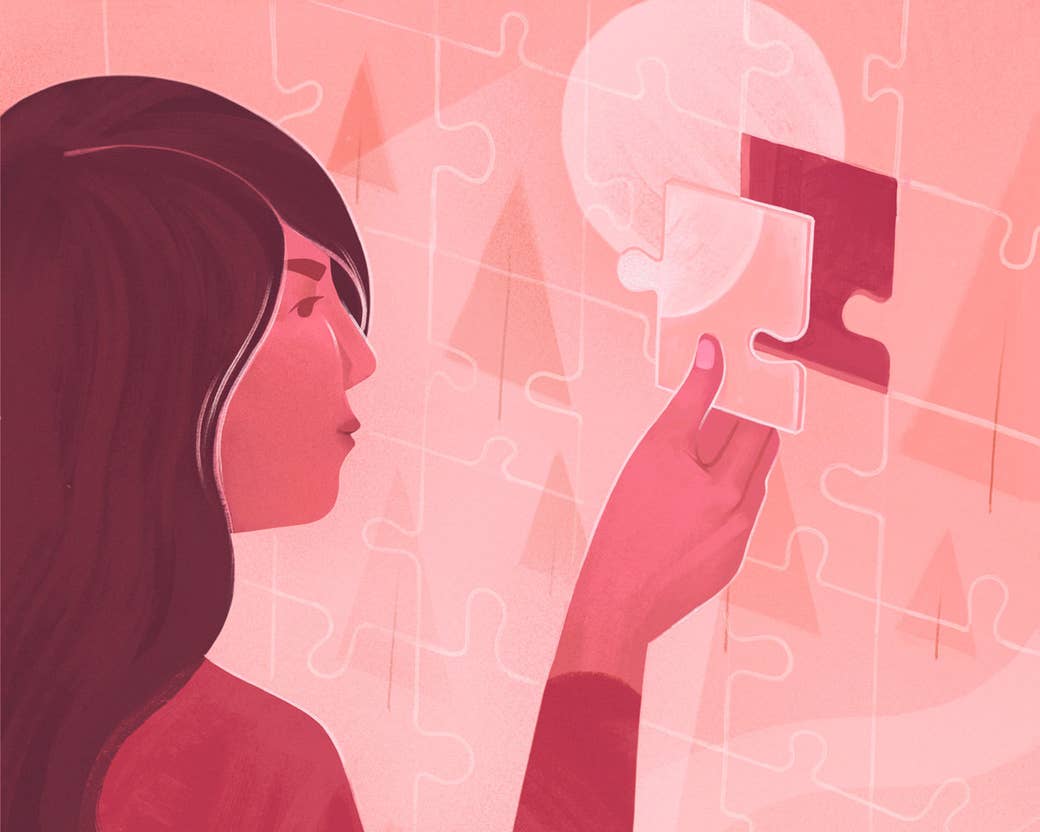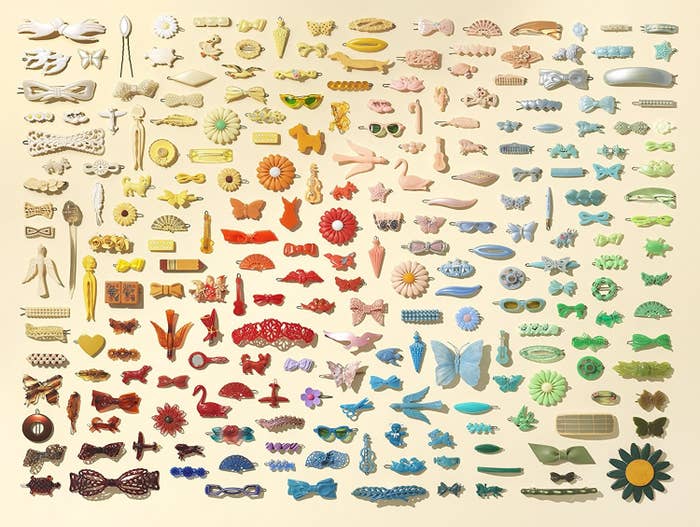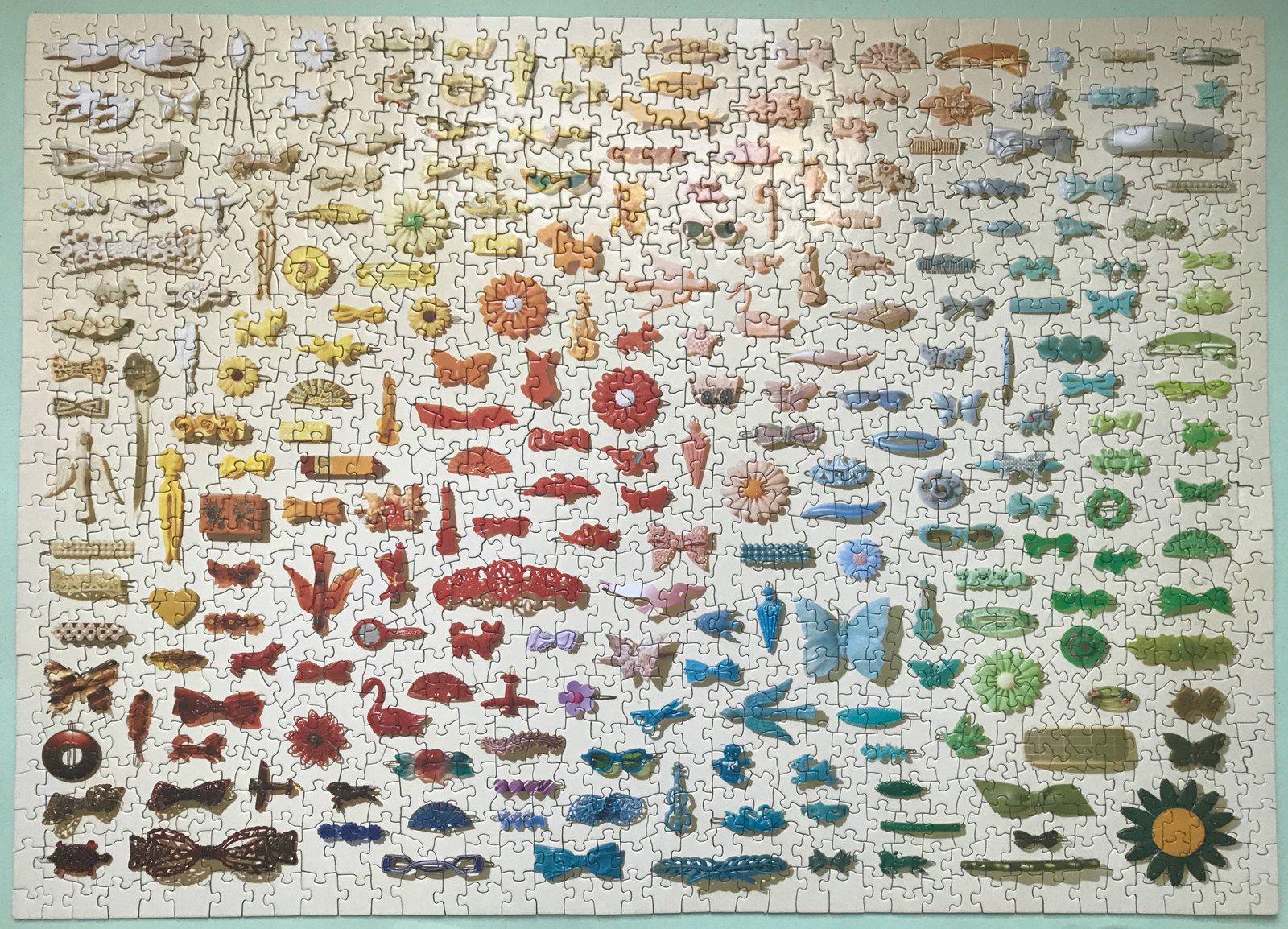
Last winter, my coworkers turned an empty desk on our floor into a puzzle table. They really liked puzzles, and we all liked the idea of occasionally standing up, having nonvirtual conversations, and looking at something other than our devices’ glowing screens. So Terri brought in a 500-piece puzzle, and every few days, she or Julie would take a little break to work on it. And I...kept meaning to take a turn, but just never really got around to it. I had nothing against the puzzle; it seemed perfectly nice. I stayed at my desk mostly due to inertia. Neither the puzzle itself nor the idea of keeping my brain and body from turning to mush were stronger than the beep beep bloop bloops of my laptop and phone.
A few weeks later, we took a coworker out to lunch for her last day, and I forgot both that it was not happy hour, and that this restaurant’s margaritas are very strong. Back at my desk, I tried to get work done...and quickly realized I had no business writing anything other than a “u up?” text. But because it is apparently “weird” and “a little concerning” to do that at 3 p.m. on a weekday, I decided that the puzzle was the next-best use of my lowered inhibitions. And after a few minutes hovering over the hundreds of brightly colored, Route 66–themed pieces, I realized... I loved doing puzzles! Of course, a drunk woman loving something she was just introduced to moments ago isn’t exactly a solid endorsement. But I went on to buy myself a beautiful 1,000-piece puzzle, which I completed over several fully sober hours in my apartment — indisputable proof that while a bit of tequila can certainly make putting tab A into slot B more fun, it’s a pretty universally satisfying experience either way.

When I’m working on a puzzle, I feel both very big and very small. I love the way the thin cardboard pieces feel as I turn them around in my fingers, sort them by color, and press them into place. I am delighted by all of the aha moments — like when it becomes clear that I’ve finally found the correct spot for a piece I’ve picked up and put down a dozen times already, or when I realize that a huge floating island I’ve constructed can now be connected to another completed expanse. I love working on the final 30 or so pieces, when I’m going based mostly on shape and not color, and am both excited to finish and trying to savor each moment. I don’t think it’s an accident that I got into puzzles during a personal low period. When your life is falling apart, literally putting something back together is powerful. It’s difficult not to find pleasure in the act of turning a disorganized pile of fragments into something beautiful and orderly. It’s even better when this doesn’t require any dirt, manual labor, talent, or skill.
Speaking of talent and skill, puzzles are an excellent hobby for people who lack both. And unlike many hobbies, puzzles don’t require you to buy a bunch of special tools or supplies just to get started, or ask that you wait out a frustrating learning period. The first thing you try to knit will probably look pretty lumpy when you are done. The first puzzle you complete will look perfect.

Equal parts soothing and stimulating, puzzles cast a gentle spell that is somehow still strong enough to pull my shoulders down from my ears in less than 10 minutes. They are, by their very nature, a challenge, but it always feels like a friendly one; I have never once doubted that the puzzle genuinely wants me to win. When I start a new puzzle, I do so with the confidence that I will be able to complete it. It becomes, then, an exercise in patience. Sure, I can devote more time each day to working on a puzzle, but, ultimately, each one will just take the amount of hours it takes. I found this frustrating at first, but I’ve since come to appreciate the steady pace of a puzzle. (Or, more accurately: I’ve come to appreciate being able to smugly say, “I’ve come to appreciate the steady pace of a puzzle.”)
When I’m working on a puzzle, I feel both very big and very small.
While I’d be lying if I said that I don’t Snapchat my progress on occasion, I typically shut my laptop and put my phone in Do Not Disturb mode in another room when I’m working on a puzzle. Instead of splitting my attention between tabs and apps, I am building a tiny universe; after just a few minutes, everything beyond its edges feels very far away. Lately, I’ve been combining puzzling and podcasts. It’s one of the only ways I can get myself to actually listen to podcasts while I’m at home, and something about the pairing feels delightfully old-fashioned — like, Gee-whiz, all it takes to keep me entertained is a jigsaw puzzle and the radio! But I often don’t even need that; I can work on a puzzle in total silence for hours. Doing puzzles makes me feel like I am healing the parts of my brain that the internet has rotted. I look for a piece I need, I find the peace I need.
While puzzles are an incredible solo activity, I’d be remiss if I didn’t mention the magic of doing them with others. As far as group activities go, they are an incredibly wholesome choice. Yes, you could suggest smoking a joint or playing Cards Against Humanity at a gathering, but you’d do so with the knowledge that you might alienate some partygoers. Puzzles though. You really can’t go wrong proposing a puzzle. They are especially good for times in which multiple generations will be together under one roof. Unlike card and board games, puzzles have no complicated rules to explain to new guests, nor do they ignite the sort of familial competitiveness that ends in tears or bloodshed. Doing a puzzle is also significantly safer than watching a movie, which may contain a graphic sex scene no one knew about. If a puzzle contains a graphic sex scene, it’ll be right there on the box.
Speaking of talent and skill, puzzles are an excellent hobby for people who lack both.
Cartographer John Spilsbury is widely credited with creating the first jigsaw puzzles; he mounted maps on wood, cut them into pieces, and used them to teach children geography. Two-hundred-and-fifty years later, puzzles are still good for helping people find their way. Even on days when I don’t make much visible progress, I, at least, always feel a little more whole when I’m done with a session. Puzzles are an incredibly pure way to begin healing a broken heart, and to occupy a mind that would otherwise be consumed by thoughts of loss, anger, fear, or simply the notifications on your phone. A puzzle won’t solve all of your problems, but a puzzle is a problem you can solve. •
